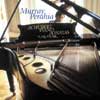Schubert Piano Sonatas Nos 19 - 21
A scrupulously modern pianist risks sounding relatively, surprisingly, detached
View record and artist detailsRecord and Artist Details
Composer or Director: Franz Schubert
Genre:
Instrumental
Label: Sony Classical
Magazine Review Date: 8/2003
Media Format: CD or Download
Media Runtime: 111
Mastering:
Stereo
DDD
Catalogue Number: S2K87706

Tracks:
| Composition | Artist Credit |
|---|---|
| Sonata for Piano No. 19 |
Franz Schubert, Composer
Franz Schubert, Composer Murray Perahia, Piano |
| Sonata for Piano No. 20 |
Franz Schubert, Composer
Franz Schubert, Composer Murray Perahia, Piano |
| Sonata for Piano No. 21 |
Franz Schubert, Composer
Franz Schubert, Composer Murray Perahia, Piano |
Author: Bryce Morrison
Expectations are raised high by every issue from Murray Perahia, one of the most subtle and distinctive musical voices of our time. After Bach and Chopin he returns to Schubert (he has previously recorded the A major Sonata, D959), offering us three of the greatest works in the history of keyboard music. Once again he disdains elaborate shows of profundity or inwardness, allowing the music its own voice, the listener his own space. These must count among the least indulgent of Schubert sonata performances on record. It is almost as if Perahia, impatient with what he sees as narcissism or self-conscious involvement, has stepped back to present arguments of an unimpeachable clarity; nothing is allowed to cloud or impede his sense of Schubert’s vast spans or the overall shape and continuity of these timeless masterpieces.
Such directness clearly has its virtues, yet for once with this pianist I became increasingly conscious of limitations, of the way sensibility is too often sacrificed on the altar of sense. You may admire the way the C minor Sonata’s opening Allegro is sturdily rather than frenetically paced, the calm after the Adagio’s octave storm at 5'03" or an exceptional thoughtfulness in the Menuetto’s trio, yet even here what I missed from such patrician mastery is the frisson that comes from a pianist more ready to re-experience the music’s darker under-currents, notably in the danse macabre of a finale. You may find that his relatively detached view of the cataclysmic storm erupting at the heart of the A major Sonata’s Andantino shows a firm sense of perspective, yet it is difficult not to feel that too great a part of Schubert’s essential character is being sacrificed for control and surface polish.
But it was in the final Sonata in B flat that I felt most short-changed. For while you could never say that Perahia’s understatement comes close to diffidence, his performance is much less urgently committed or lit from within than by such classic interpreters on record as Schnabel, Curzon (although his Decca version is out of the catalogue at the moment), Lupu, Uchida and, most notably, Kempff. At 3'34" in the Andante the playing is surprisingly hefty from the normally translucent Perahia, the return of the principal theme more laissez-faire than numbing. He is also much less adept at reading between the lines in the Scherzo’s trio than one had hoped, while the finale’s quirky, stop-go progressions are taken almost at face value.
Again, the issue is a personal one. Perahia’s is a scrupulously modern voice, always aiming for an impeccable balance that excludes tempting asides or the appeal of the moment. But, for once, his personal and very recognisable quality is only intermittently present, a lack compounded by Sony’s sound which is without the finest range, warmth and colour.
Such directness clearly has its virtues, yet for once with this pianist I became increasingly conscious of limitations, of the way sensibility is too often sacrificed on the altar of sense. You may admire the way the C minor Sonata’s opening Allegro is sturdily rather than frenetically paced, the calm after the Adagio’s octave storm at 5'03" or an exceptional thoughtfulness in the Menuetto’s trio, yet even here what I missed from such patrician mastery is the frisson that comes from a pianist more ready to re-experience the music’s darker under-currents, notably in the danse macabre of a finale. You may find that his relatively detached view of the cataclysmic storm erupting at the heart of the A major Sonata’s Andantino shows a firm sense of perspective, yet it is difficult not to feel that too great a part of Schubert’s essential character is being sacrificed for control and surface polish.
But it was in the final Sonata in B flat that I felt most short-changed. For while you could never say that Perahia’s understatement comes close to diffidence, his performance is much less urgently committed or lit from within than by such classic interpreters on record as Schnabel, Curzon (although his Decca version is out of the catalogue at the moment), Lupu, Uchida and, most notably, Kempff. At 3'34" in the Andante the playing is surprisingly hefty from the normally translucent Perahia, the return of the principal theme more laissez-faire than numbing. He is also much less adept at reading between the lines in the Scherzo’s trio than one had hoped, while the finale’s quirky, stop-go progressions are taken almost at face value.
Again, the issue is a personal one. Perahia’s is a scrupulously modern voice, always aiming for an impeccable balance that excludes tempting asides or the appeal of the moment. But, for once, his personal and very recognisable quality is only intermittently present, a lack compounded by Sony’s sound which is without the finest range, warmth and colour.
Discover the world's largest classical music catalogue with Presto Music.

Gramophone Digital Club
- Digital Edition
- Digital Archive
- Reviews Database
- Full website access
From £8.75 / month
Subscribe
Gramophone Full Club
- Print Edition
- Digital Edition
- Digital Archive
- Reviews Database
- Full website access
From £11.00 / month
Subscribe
If you are a library, university or other organisation that would be interested in an institutional subscription to Gramophone please click here for further information.




